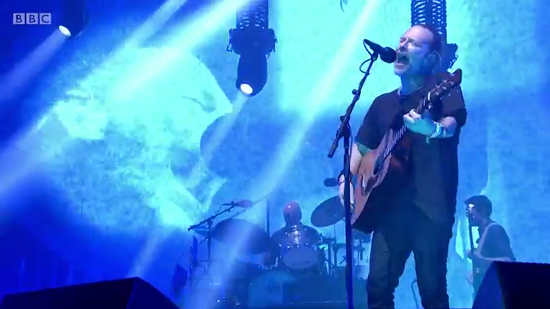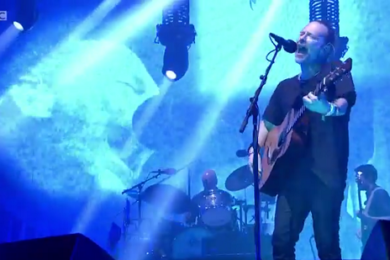Not long after Radiohead finished their Glastonbury Friday night headline show, I send out a tweet on The Quietus account. “A set of ups and downs,” I called it, “but with some genuinely transcendent moments.” I was at Worthy Farm covering the festival for a special edition of our weekly radio programme, plus some social media coverage. From where I was standing – around the front part of the middle – I considered that a fair assessment.
I crawled out of my tent the next morning, charged my phone and was met with a stream of apparently universal disagreement. ‘I don’t know how you could say that if you’re a fan?!’ exclaimed one, ‘Struggling to think of any downs, they were fucking magnificent!’ said another. Geoff Barrow from Portishead, asked: ‘Why ups & downs? Sounds great on tv, was it an IKEA audience?’ Twitter and Facebook were alight with praise for Radiohead. Those watching the BBC’s coverage of Radiohead had judged their performance a monumental success. This came as a surprise.
It’s commonly known that Radiohead’s festival sets are more replete with the ‘hits’ than they might otherwise be, and it’s the material cut from their OK Computer/Kid A period of mass popularity that provide the aforementioned moments of transcendence for those on the ground. Opener ‘Daydreaming’, for example, sounds beautiful, but in terms of atmosphere, it’s not until ‘Lucky’, which follows it, that the mood of those around me really kicks into gear. Likewise, ‘Ful Stop’, which follows, is a pacy but ineffective segue before ‘Airbag’, which garners a roar of excitement.
This is not so, however, when I watch the footage back on iPlayer. ‘Daydreaming’, I realise, was not the calm before the storm, it was a moment of serene Pyramid stage beauty in and of itself; ‘Ful Stop’ is not the rapid bridge between hits that goes over our heads, but a manic, off-kilter rave that’s an instant plunge into total immersion. The brilliant bits on the ground are still brilliant on screen – Radiohead’s ability to unleash the odd arena-worthy belter should never be underestimated – but their nuances sound marvellous too. In short, I can kind of see your point, people of Twitter.
One of my favourite parts of Glastonbury each year is the post-mortem: trawling through iPlayer, reliving the highlights, seeing what you missed, dissecting as a distraction from the comedown. Occasionally the Worthy Farm spell has worn off by the time you get a chance to watch a band back – Saturday evening’s #GlastoMoment can often be Tuesday afternoon’s profound flash of regret – but rarely has one experience been so profoundly different to the other as when I returned to Radiohead. Watching their set from the ground was not, let me make it clear, ‘bad’ – the blissful melancholy that greeted ‘Let Down’’s closing swell is a contender for the most powerful sensation I’ve ever felt in front of the Pyramid – but on iPlayer this sense of satisfaction felt so much more consistent and complete.
Which begs the question, of course, why? My different experience was not, as was accused online, due to “a dodgy acid”, nor would it be fair to say that Radiohead are simply not a live band. Their musicianship is all but faultless, both on the ground and watching it back. Thom Yorke’s voice is crystal clear, the rest of the band are limber and smooth as they weave in and out of each other. In fact, in terms of the often tricky task of sounding decent on an outdoor festival stage (their set here 20 years ago was infamously plagued by issues), it’s impeccable. The set sees every Radiohead album represented at least once, and each has its relative virtues brought to the fore – the detached, sneaking terror of Kid A, the laced beauty of In Rainbows and the craftsmanship of The Bends. even the much-maligned ‘Creep’’s run-out at the encore feels imbued with a kick that gives it more substance than an ironic singalong.
Radiohead’s headline set at Glastonbury 2017, then, should really have been a triumph, and watching it back later, it appeared as such. Yet on the ground there was something missing for a great deal of the gig. It’s a matter, I believe, of engagement. The reason there were downsides is because at the points where a set hinges on depth and subtlety, many see an opportunity to disconnect from the experience – just as it’s crucial to remain onside.
What should have been ebbs and flows become peaks and troughs. The bracing brilliance of ‘Airbag’ and the singalong-ready choruses of ‘Creep’ and ‘Fake Plastic Trees’ are a fantastic live experience, but the woozier, more off-kilter moments that counter them, ‘Pyramid Song’ and ‘Myxomatosis’, aren’t given the same room to breathe by the crowd. The set is so good on TV because of its breadth and its multifaceted nature, but these juxtapositions become jarring when you’re in the crowd.
The flaws on Radiohead’s part are almost non-existent, and they play pretty much undistracted by the occasion. There are, as was probably to be expected in the ongoing controversy surrounding their decision to play a gig in Tel Aviv, an array of Palestinian flags among the crowd, but this goes entirely unacknowledged. In fact, Yorke’s stage patter as a whole is sparse and – aside from his brief shot at Theresa May – relatively glib. “I don’t really have any words, I’m useless at this stuff…” he mumbles; there’s a sense, to coin a cliche, that he’d rather let the music do the talking.
This is a set that’s all about the trajectory, a trajectory that was simply interrupted too often by a crowd whose engagement kept wavering for me to enjoy it to its full expanse on the ground. Of course this could simply be down to unfortunate positioning on my part; I imagine my experience might well have been closer to those at home had I not been surrounded by a relatively apathetic swathe of festivalgoers at a loose end as to their choice of Friday headliner.
With all that said, it’s worth reiterating just how good the ‘ups’ or Radiohead’s set were, particularly when the crowd around me allowed two or three to be strung together, to let the momentum really flow. The closing five, more than any, an emotive journey from ‘Paranoid Android’ to ‘Karma Police’, via ‘Fake Plastic Trees’, ‘Lotus Flower’ and ‘Creep’, is a Glastonbury memory as unforgettable as they come.



